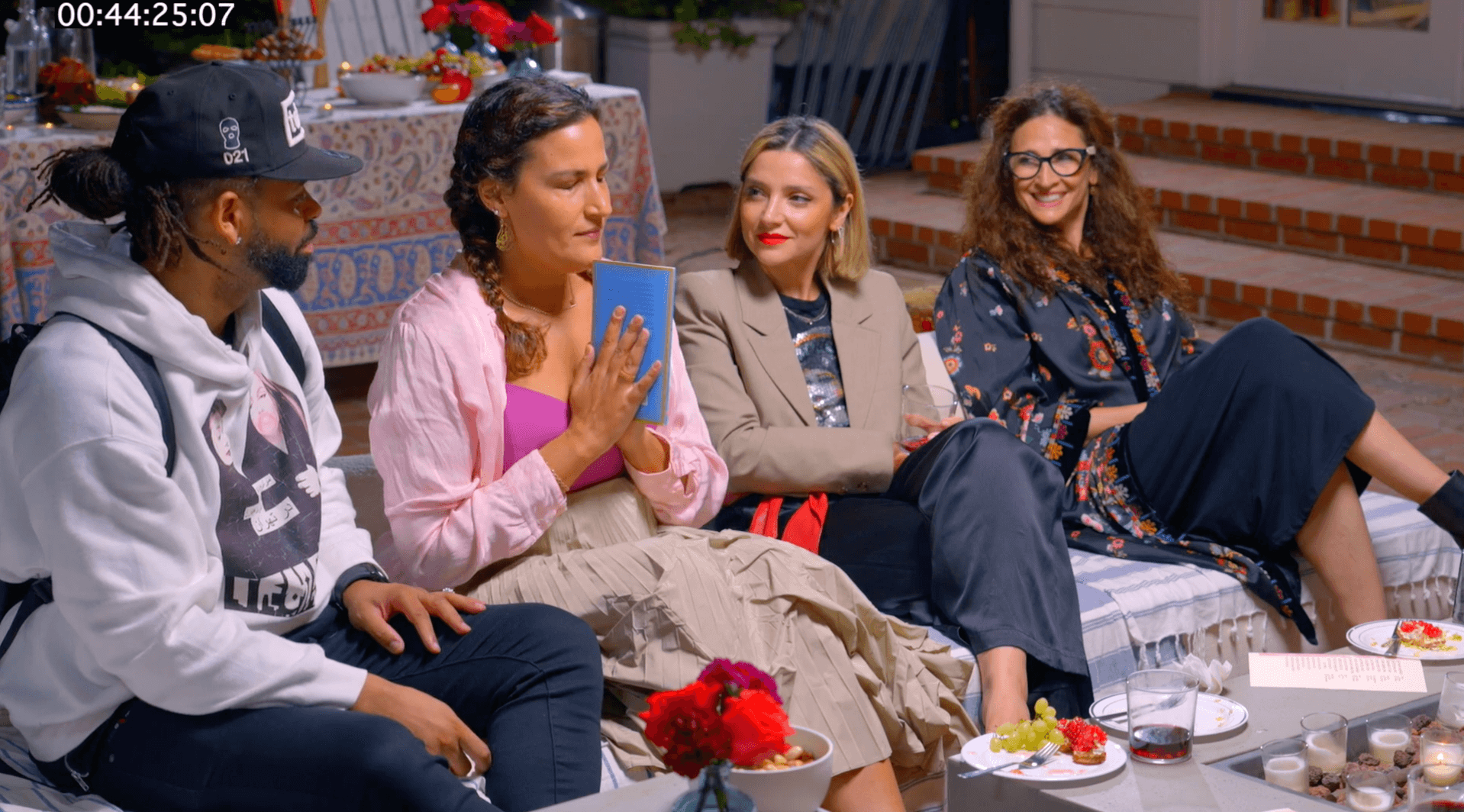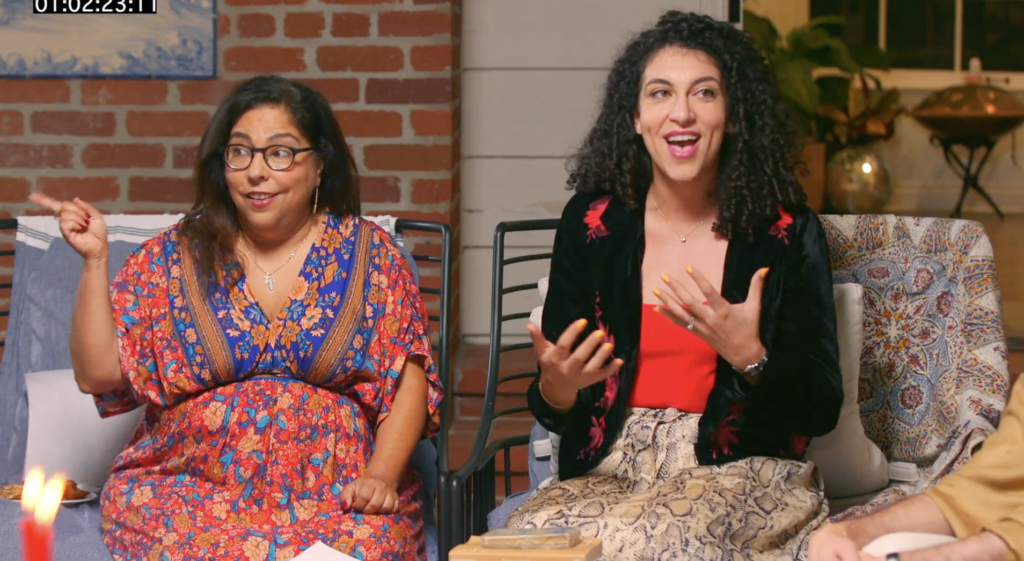Christmukkah is old news. This year, try merging Hanukkah with an ancient Persian holiday
Two L.A. Jews blended Hanukkah customs with those belonging to Yalda — to tremendous results

Sufganiyot filled with Iranian sour cherry jam and Iranian zoulbia pastries adorn the Erev Yalda table. Courtesy of Tanaaz Sassooni
While the mainstream media is obsessing over Christmukkah, two Jewish women in Los Angeles have quietly and elegantly merged Hanukkah with an ancient Persian tradition — creating what they hope will be an enduring cultural mash-up.
I was there at the inception of Erev Yalda, witnessing the way two cultures’ traditions can braid into something meaningful for both — a daring act at a time when social media algorithms and our toxic politics thrive on stoking divisions and catering to extremes.
Erev is the Hebrew word for evening, and Yalda is a ritual, celebrated in Iran, Afghanistan and Azerbaijan, marking the winter solstice, dating back to at least 500 B.C.E.
“As Iranian Jews we’re bringing our two traditions together, Yalda and Hanukkah,” Tannaz Sassooni, a food writer and occasional Forward contributor, announced to seven guests as we stepped into the backyard of a sprawling West Los Angeles home aglow with candles, twinkle lights and a fire pit — and boasting a very eye-catching buffet.

On Yalda, family and friends traditionally gather outside around a fire, eating traditional red foods — watermelon, pomegranate, grapes, apples — to symbolize life and warmth in a cold, dark time. Or, as Sassooni put it, “to recall the crimson dawn when the sun rises in the morning.”
Like Hanukkah, when Jews light candles and recite blessings, Yalda, is a holiday centered on light: Persians sit around the fire and read the poems of their most celebrated poet, Hafiz.
On Erev Yalda, the ceremony of which ReBoot Studios recorded and posted to YouTube, we did both.
“We’re allowed to bring these traditions and fuse them, as long as it’s around love,” said co-organizer Rachel Sumekh, a nonprofit consultant.
In Iran millions of people celebrate Yalda, spending up to 25% of their average monthly salary on the evening’s food and festivities. Blending one of Iran’s most important celebrations with Jewish traditions at a time when Israel and Iran are locked in escalating tension is a thoughtful way to remind us of our common humanity.

And that commonality begins with — what else? — food.
Along with laying out the traditional red fruits, Sassooni cooked what might be the first ever Hanukkah-Yalda fusion cuisine. Along with the traditional plates of nuts, fresh herbs and cheeses that accompanies every Persian celebration, Sassooni made a fava bean and dill rice pilaf with a crisp crust of shredded potatoes — “latke tahdig,” she called it.
Hanukkah demands foods fried in oil, so in lieu of the traditional Sephardic fried pastries like Moroccan sfenj or Mexican bunuelos, Sassooni fried curlicues of yeast dough into Iranian zoulbia, coating them in a cardamom and orange-blossom scented syrup.
And — her best idea of all — Sassooni injected traditional Hanukkah donuts, sufganiyot, with dark red Iranian sour cherry jam, moraba albaloo.
“Iran doesn’t have a specific Hanukkah culinary tradition,” said Sassooni. But Erev Yalda does now.
Before lighting Hanukkah candles, we sat around the fire and engaged in another Yalda tradition, reading aloud and discussing the works of Hafiz, the 14th-century poet who remains Iran’s most beloved writer.
This is where the evening got personal, mystical, and very un-Hanukkah. Iranians use Hafiz poems for divination, so Sumekh instructed us to flip to any page of the poet’s collected works without looking, and read the poem aloud, because that would be the poem fate decreed we needed to read.
(Tara Grammy, an actor and playwright, demonstrated how her Iranian mother did it, closing her eyes, sneaking a peak at the page — “No, not that one” — then skipping to another.)
When the actor Michaela Watkins flipped to a page, she glanced and said, “Wow! Of course this one.” The poem she randomly selected spoke to the fact that a series of setbacks had recently occurred in her life. The poem’s title: “Of Course Things Like That Can Happen.”
“Once God made love to a great saint,” she recited, “who had a hairy belly. Of course things like that can happen, and life went on, amid 10,000 other wonders.”
The message: stuff happens, and life miraculously goes on.
“Iranians are very good at using comedy in times of tragedy,” said Dr. Shaba Shayani, professor of Persian literature at UCLA.
“Sounds a lot like…the Jews,” said Jonathan York, a lawyer and artist who hosted the event at his home.
The poems had that effect, emphasizing the fusion of cultures, of shared truths of existence, that was the core of the new holiday’s purpose.
The comedian and actor Tehran Von Ghasri said his selection from Hafiz, about an eagle that “craves dry bones,” reminded him that, “Right wing, left wing, same bird. We either fly together or we fall.”
My turn came. I flipped to a poem, and read.
“A poet is someone who can pour light into a spoon,” Hafiz wrote, “then raise it to nourish your beautiful parched holy mouth.”
I said my own, “Wow.” Someone who writes frequently about food had landed on a poem about the power of words, using food and cooking as a metaphor. It did seem that Erev Yalda, like the most profound holiday rituals, opened daily existence to the possibility of the transcendent.
Because ReBoot filmed the event two months before Hanukkah, which starts the evening of Dec. 25, we lit the Hanukkah candles early, recited the blessings, and watched as the candles jumped to life above the flames of the Yalda fire.
Jews and Iranians, said Sumekh, “inherited these rituals, just like all the traumas we’ve inherited.”
Now, she said, it was time to make them both our own.
















